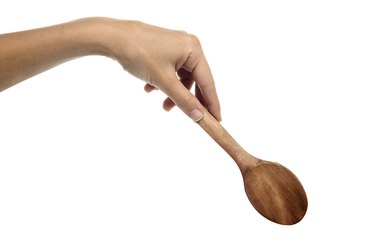
The right tools can make the difference between a passable meal and one that's truly memorable. In this age of extreme specialization, where your average cooking store carries four versions of every tool and thousands more are available on the Internet, it's not easy to choose the right tool for the right job. One confusing area is trying to decide between plastic and wood. Don't worry. With the right information, you can pick the perfect tool for your cooking.
When to Use Wood
Video of the Day
Wood utensils aren't the best tools for every cooking task, but they are perfect for some things. Wood is a good choice when you're working with hot foods that require frequent stirring, such as risottos, some soups and candies. In fact, Food Network television host Alton Brown recommends wooden spoons when working with candy syrups, as they help distribute heat evenly. Wood is also a good choice when working with delicate copper cookware or nonstick cookware, as it won't scratch the surface.
Video of the Day
When to Use Plastic
Like wood, plastic utensils are useful in some situations, but not in all. Plastic utensils can melt if they come into contact with burner elements, the sides of pots, or hot syrups. Thus, plastic is best when you're working with low or no-heat applications, such as stirring cookie dough, scraping bread batters off bowls, or using plastic measuring cups and spoons to measure ingredients. Most plastic cooking utensils are dishwasher safe, though some should only go on the top rack, so check the manufacturer's instructions.
Considerations
Both plastic and wood cooking utensils have limitations. Wood can crack over time, especially if you put it in the dishwasher or repeatedly expose it to heat. When that happens, food can get stuck in the utensil and allow dangerous bacteria to grow. Plastic, as previously stated, can melt. Another issue is bisphenol A, or BPA, a chemical found in some plastics that may hinder development in infants and children (Reference 2). If you're concearned about BPA, look for utensils marked "BPA free."
Alternatives
If you don't want to buy two sets of utensils for different situations, there are alternatives to plastic and wood cooking utensils. Silicone spatulas, for example, won't scratch delicate cookware and won't melt. Another good alternative is nylon cookware, which is good for pancake turners and measuring vessels, as it holds its shape better than silicone. However, "Cook's Illustrated" magazine warns that silicone bakeware tends to be too floppy to work well.